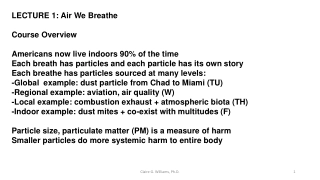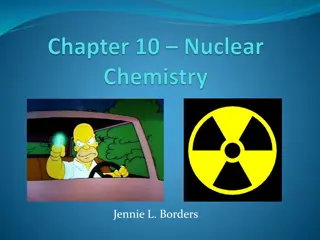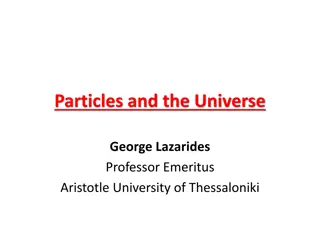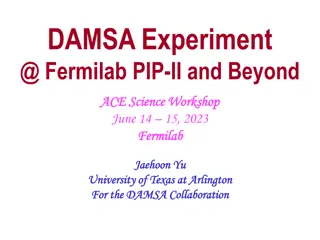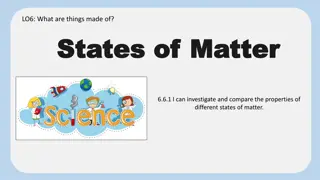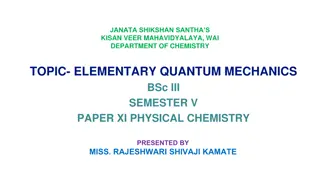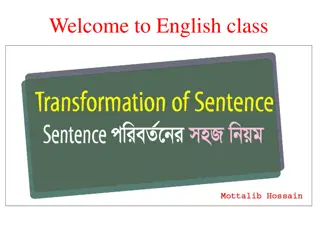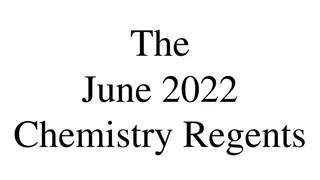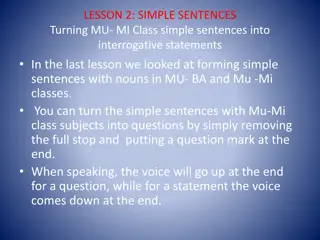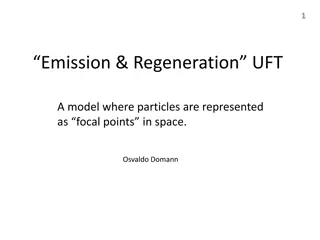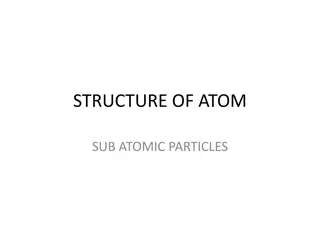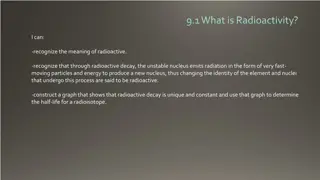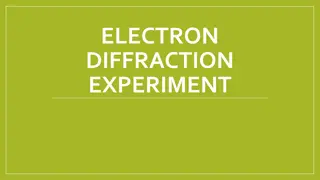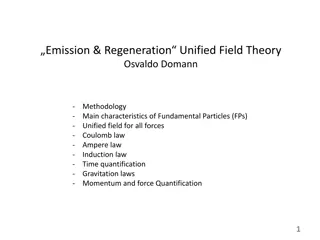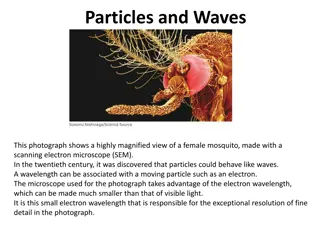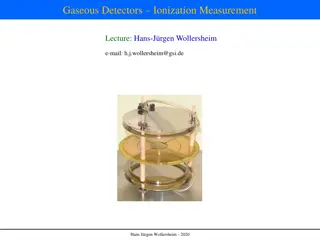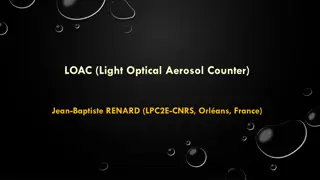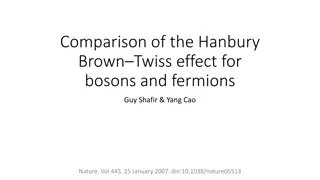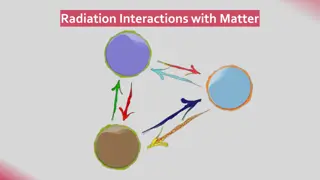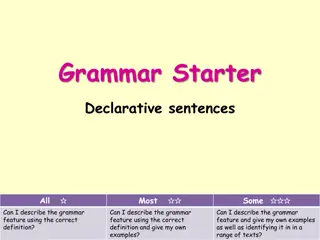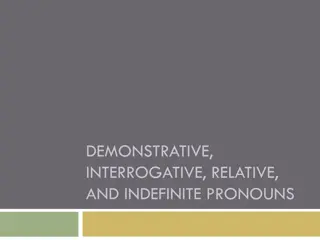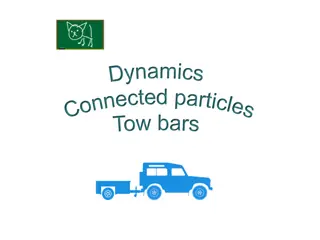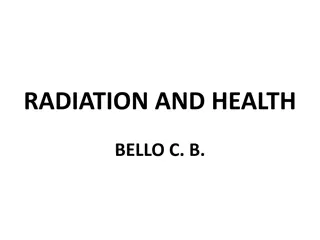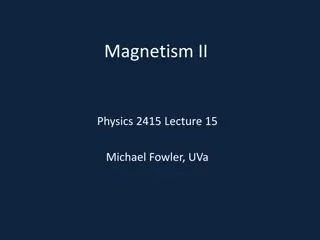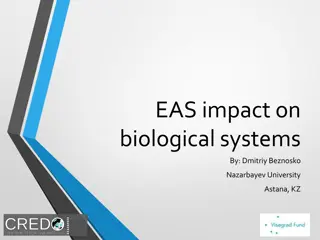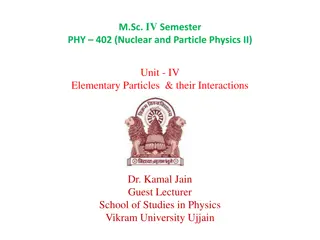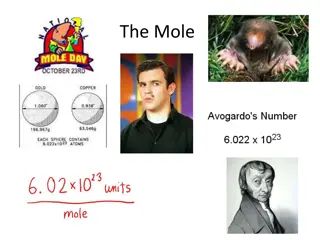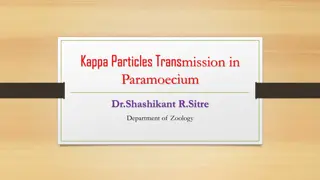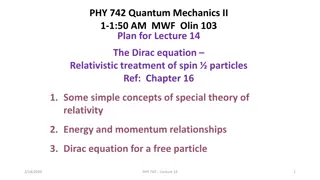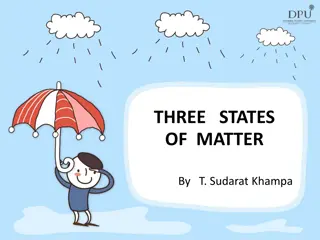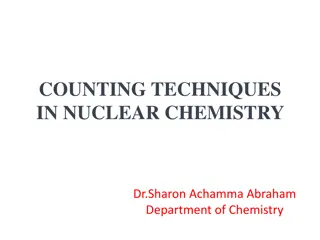LECTURE 1: Air We Breathe Course Overview
Americans predominantly spend 90% of their time indoors, where each breath taken contains particles sourced from various levels - global, regional, local, and indoor sources. These particles, known as particulate matter (PM), can have differing effects on the body based on their size, with smaller p
2 views • 18 slides
Assertive to Interrogative: English Grammar Exercises and Practice
Enhance your English grammar skills with exercises on changing assertive sentences into interrogative ones. Learn how to transform sentences using auxiliary verbs, modal verbs, and without auxiliary verbs through practical examples and practice questions. Improve your sentence structure and comprehe
4 views • 24 slides
Radioactive Decay and Nuclear Radiation
Radioactive decay is the process in which unstable atomic nuclei emit charged particles and energy, transforming into different elements. This process involves the emission of alpha particles, beta particles, and gamma rays. Alpha particles consist of two protons and two neutrons, beta particles are
4 views • 31 slides
Particles and Fundamental Interactions in the Universe
Delve into the intricate world of particles and fundamental interactions in the Universe as explained by Professor Emeritus George Lazarides from Aristotle University of Thessaloniki. Discover the structure of matter, classification of particles based on interactions, constituents of hadrons, conser
1 views • 36 slides
Dark Sector Particles at Fermilab PIP-II and Beyond
The DAMSA experiment at Fermilab PIP-II aims to search for Dark Sector Particles (DSP) using a high-intensity proton beam facility. By focusing on Axion-like particles and employing specific physics strategies, DAMSA seeks to penetrate the low mass regime and discover rare particles in unexplored ki
6 views • 22 slides
States of Matter: Solids, Liquids, and Gases
Matter is anything that occupies space and has mass, consisting of tiny particles like atoms and molecules. Solids have closely packed particles, liquids have less densely packed particles that can flow, and gases have spread out particles. Solids retain their shape, liquids take the shape of their
7 views • 11 slides
Heisenberg's Uncertainty Principle in Elementary Quantum Mechanics
Heisenberg's Uncertainty Principle, proposed by German scientist Werner Heisenberg in 1927, states the impossibility of simultaneously and accurately determining the position and momentum of microscopic particles like electrons. This principle challenges classical concepts of definite position and m
0 views • 49 slides
English Transformation Rules: Assertive to Interrogative with Examples
Learn the rules of transforming assertive sentences into interrogative sentences in English grammar. Understand the different scenarios and examples for the transformation process. Enhance your skills in using interrogative sentences in various situations while maintaining the original meaning. Dive
4 views • 23 slides
Chemistry Regents June 2022 - Subatomic Particles and Atomic Experiments
Understanding subatomic particles, atomic experiments, and spectroscopy concepts in chemistry for the June 2022 Regents exam. Learn about particle charges, gold foil experiment conclusions, and bright-line spectrum elements.
0 views • 167 slides
Forming Interrogative Statements in Luganda with MU-MI Class Subjects
Learn how to turn simple sentences with MU-MI class subjects into interrogative statements in Luganda by replacing the full stop with a question mark. Understand the changes in prefixes when forming questions, such as 'g' to 'gy' and 'gu' to 'gwa'. Practice examples and grasp the rules for creating
0 views • 10 slides
Radioactivity and its Particles in Radiochemistry
Radioactivity involves the spontaneous decay of unstable atomic nuclei, releasing radiation in the form of alpha particles, beta particles, and gamma rays. Alpha particles are heavy and have low penetration, beta particles are light and faster, while gamma rays are high-energy waves with great penet
2 views • 20 slides
Realistic Particle Representations and Interactions in Emission & Regeneration UFT
The presentation explores a model in which particles are depicted as focal points in space, proposed by Osvaldo Domann. It delves into theoretical particle representations, motivation for a new approach, and the methodology behind the Postulated model. Additionally, it delves into particle represent
2 views • 24 slides
Nature of Subatomic Particles and Light
Explore the intricate world of subatomic particles such as electrons, protons, and neutrons, and delve into the dual nature of light as both particles and waves. Discover the structure of atoms, their isotopes, atomic number, mass number, and the fundamental discoveries in the field of physics, incl
1 views • 16 slides
Quantum Mechanics of Hydrogen Molecule Rotations
Dive into the intriguing world of molecular rotations in hydrogen molecules, exploring topics such as rotational heat capacity, moment of inertia, nuclear spin isomers, and wave number calculations. Understand the implications of particle interactions, distinguishable vs. indistinguishable particles
0 views • 23 slides
Radioactivity and Nuclear Radiation
Radioactivity is the process in which unstable nuclei emit radiation, such as alpha, beta, or gamma particles, to become stable. This emission can change the element's identity and is crucial in fields like nuclear power and understanding Earth's core heat source. Different radioactive isotopes like
0 views • 12 slides
Exploring Wave-Particle Duality in Electron Diffraction Experiment
Delve into the fascinating world of wave-particle duality through an electron diffraction experiment that reveals the dual nature of particles and waves. By investigating the wave characteristics of electrons and measuring their De Broglie wavelength, this experiment sheds light on the fundamental p
1 views • 12 slides
Unified Field Theory of Fundamental Particles by Osvaldo Domann
Methodology, characteristics, and interactions of Fundamental Particles (FPs) in the Unified Field Theory proposed by Osvaldo Domann are explored. The theory covers the unified field for all forces, quantum laws, momentum quantification, and more. It introduces the concept of Fundamental Particles m
0 views • 21 slides
Combined Effect of Charged Particles Irradiation and Anticancer Drugs in Cultured Human Tumor Cells
Research collaboration aimed to enhance locoregional tumor control and reduce distant failure by combining charged particles irradiation and anticancer drug Epothilone B in cultured human tumor cells from Milano and Roma. The study explores the impact on clonogenic survival, growth curves, and deter
0 views • 13 slides
Dual Nature of Particles and Waves in Physics
This collection of images and information delves into the intriguing concept of the dual nature of particles and waves in the field of physics. From the historic Young's double-slit experiment demonstrating the wave nature of light to Louis de Broglie's groundbreaking work assigning a wavelength to
3 views • 15 slides
Insights into Gaseous Detectors for Ionization Measurement
Delve into the world of gaseous detectors for ionization measurement, as discussed by Hans-Jürgen Wollersheim. Topics include the Bethe-Bloch formula, ionization detectors, effective ionization energies, charge transport in gas, ion mobility, and electron mobility in gases. Explore concepts such as
2 views • 29 slides
Light Optical Aerosol Counter (LOAC) Project Overview
Light Optical Aerosol Counter (LOAC) is a project led by Jean-Baptiste Renard in France, involving a collaboration between research institutions, private companies, and the French Space Agency. The LOAC instrument, weighing 1 kg, is used with meteorological balloons to measure concentrations of aero
0 views • 21 slides
Health Education Unit Overview
This educational unit focuses on identifying and using different illnesses, practicing the interrogative form of present continuous tense, and enhancing listening, speaking, and writing abilities. Students will learn about various common illnesses and how to form interrogative sentences in the prese
0 views • 10 slides
English 2nd Paper Class for HSC/Alim - Assertive, Interrogative, Exclamatory Sentences Practice
Join Sabina Yeasmin's English 2nd Paper class at Baridhara Nazmul Ulum Alim Madrasah, Dhaka for HSC/Alim students. Practice converting assertive to exclamatory and interrogative sentences. Explore examples like "Anger is nothing but a vice" transformed to "Is anger anything but a vice?" Learn how to
0 views • 11 slides
Comparison of Hanbury Brown Twiss Effect for Bosons and Fermions
This study compares the Hanbury Brown Twiss (HB&T) effect for bosons and fermions, showcasing how different correlation functions apply to these particles in quantum systems. The analysis delves into the mathematical structures and order correlations for both bosons and fermions, illustrating the ph
0 views • 13 slides
Ionizing Radiation and Its Interactions with Matter
Ionizing radiation interacts with matter in direct and indirect ways, leading to various effects on biological systems. Directly ionizing particles disrupt atomic structures, while indirectly ionizing radiation like electromagnetic waves produce secondary electrons. Alpha particles have high ionizat
0 views • 22 slides
Examples of Declarative and Interrogative Sentences
Explore examples of declarative and interrogative sentences, understand their definitions, and learn to convert questions into statements. Dive into various texts to identify these sentence types and enhance your grammar skills.
1 views • 5 slides
Mastering Quranic Arabic: Surah Baqrah and Interrogative Particles
Dive into Surah Baqrah verses 14-15 as we explore their meanings, alongside a study of Interrogative Particles in Arabic grammar. Prepare to reflect on the deeper teachings during your next salah.
1 views • 65 slides
Demonstrative, Interrogative, Relative, and Indefinite Pronouns
Demonstrative pronouns point out specific people, places, things, or ideas. They include "this," "that," "these," and "those." Interrogative pronouns introduce questions and include "what," "which," "who," "whom," and "whose." Understanding the usage of these pronouns is essential in forming clear a
0 views • 21 slides
Dynamics of Connected Particles in Physics
Delve into the world of connected particles in physics with a focus on tow bars, forces, and Newton's laws. Explore problems involving connected particles moving in the same direction and analyze scenarios like towing cars along a road. Gain insights into tension, accelerations, resistances, and for
0 views • 14 slides
Radiation and Its Effects on Health
Radiation is a form of energy that can be emitted from radioactive materials in the form of particles or waves. It can be either ionizing or non-ionizing, with ionizing radiation having the ability to penetrate tissues and deposit energy within them. While alpha particles, beta particles, x-rays, an
1 views • 38 slides
Magnetism: Forces, Fields, and Applications
Explore the fascinating realm of magnetism in Physics as you delve into topics such as forces on charged particles, path of particles in magnetic fields, torque on current loops, and Earth's magnetic field alignment. Learn about the force on straight wires and electric charges in magnetic fields, an
0 views • 14 slides
The Impact of Ultra-High Energy Particles on Biological Systems
Ultra-high energy particles from outer space create Extended Air Showers (EAS) when interacting with Earth's atmosphere, leading to the formation of dense cores emitting radiation. These particles can affect biological organisms, memory storage, and health risks, with implications for medical resear
0 views • 5 slides
Elementary Particles and Their Interactions in Nuclear and Particle Physics
Delve into the fascinating world of elementary particles, where quarks form the basis of protons and neutrons in the nucleus, alongside electrons. Discover a diverse array of particles such as muons, neutrinos, and quarks, each with unique properties of charge and mass. Uncover the significance of t
0 views • 10 slides
Moles in Chemistry
Matter is composed of various particles, and chemists use the concept of moles as a unit of measure to quantify the number of particles in a substance. One mole is equal to 6.02 x 10^23 representative particles of a substance, known as Avogadro's number. Moles are versatile and applicable to differe
0 views • 25 slides
Kappa Particles Transmission in Paramecium
Research by Dr. Shashikant R. Sitre delves into the transmission of kappa particles in Paramecium, revealing the presence of these cytoplasmic particles in specific strains. The interaction between killer and sensitive strains, controlled by the dominant K gene, sheds light on cytoplasmic heredity a
1 views • 10 slides
Relativistic Treatment of Spin Particles: Dirac Equation & Special Relativity
Exploring the Dirac equation for spin particles within the framework of special theory of relativity. Topics covered include energy-momentum relationships, basics of special relativity, Lorentz transformations, and relativistic effects on particles. The lecture delves into the interplay between quan
0 views • 23 slides
THREE STATES OF MATTER
Matter, defined as anything with mass and volume, exists in three states: solids, liquids, and gases. Each state has distinct properties based on particle arrangement, energy, and distance between particles. Solids have a fixed shape and volume with particles in a tight pattern, while liquids take t
0 views • 34 slides
Master Quranic Arabic in 24 Hours - Hour 21: Surah Baqrah and Interrogative Particles
In this lesson, we delve into Surah Baqrah verses 14-15, exploring the behavior of hypocrites towards believers as mentioned by Allah. Learn about the punishment for hypocrites and the importance of attendance in mastering 173 words repeated 23,117 times in the Quran. Dive deeper into grammar and re
0 views • 64 slides
COUNTING TECHNIQUES IN NUCLEAR CHEMISTRY
The basic principle behind the detection of nuclear particles involves ionization or excitation of atoms/molecules when matter absorbs energies of nuclear particles. Common techniques for detection include GM Counter, Ionization Counter, Proportional Counter, Scintillation Counters, and Cloud Chambe
0 views • 12 slides
Event Displays in DESY Testbeam Run 6953
The event displays from DESY Testbeam Run 6953 showcase particle interactions in a 0.5 T magnetic field at a beam momentum of 6 GeV/c. These high-resolution images capture the trajectory of particles as they move through the detector, providing insights into particle physics experiments at DESY's LC
0 views • 15 slides
